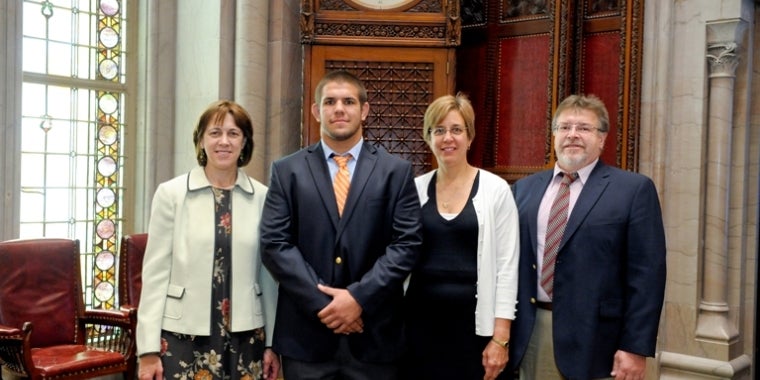
Legislation eyed to give flood victims relief from taxes on damaged house
Monday, September 9, 2013
By John Enger
Gazette Reporter
FORT PLAIN — A big chunk of Tammy Erhardt’s 22 Abbott St. residence is long gone, but her tax bill is intact and right on time.
On June 28, Otsquago Creek flood waters tossed a neighbor’s house against her son’s bedroom, causing heavy damage. The Erhardts were gone at the time — more fortunate than the resident of the floating house, 87-year-old Ethel Healey, who died in the flood.
Erhardt feels lucky, but still was taken aback by the property tax bill that arrived in the mail last week.
“I basically have half a house right now,” she said, “but I have to pay the full tax.”
Sen. Cecilia Tkaczyk, D-Duanesburg, and Assemblyman Angelo Santabarbara, D-Rotterdam, met with local officials at Harry Hoag Elementary School in the village Monday morning to promote legislation that could give the Erhardt family and many others a hand.
“When I was touring Fort Plain after the flooding,” Tkaczyk said, “they asked me to help them with their property taxes.”
She and Santabarbara are currently lobbying state Senate and Assembly leaders to reconvene the Legislature to work on the problem.
Tkaczyk introduced the Flood Assessment Relief Act of 2013 in the Senate shortly after the actual flash flood. Initially, she wanted to give homeowners in Fort Plain an opportunity to have their property reassessed for a break on their 2013 property taxes, but Herkimer, Madison, Niagara and Oneida counties were eventually added into the legislation.
Santabarbara got on board more recently, proposing companion legislation in the Assembly.
The concept is pretty simple: Flood waters damaged or destroyed hundreds of structures across five counties, but the properties are still assessed at pre-flood value. Under current law, residents can get their homes reassessed, but the new assessment won’t be used to calculate taxes until 2014.
Tkaczyk’s legislation allows homeowners to backdate the reduced assessment to June and see a break on this year’s taxes. A similar piece of legislation was passed after Tropical Storm Irene, when a similar situation arose: Property owners getting next year’s tax bill on a house that no longer existed.
“But we need to have the Legislature back in Albany to do this,” Tkaczyk said, urging the few attendees at Monday’s meeting to write letters to Senate and Assembly leaders.
She couldn’t comment on how likely such a state government move might be, but hopes to gain approval for the relief act within the next week or two.
“People already have their property tax bills,” she said. “They’re due in a few weeks.”
Even if the act is not passed before property taxes come due, Santabarbara said, homeowners could still get a belated tax break.
“If we have to wait until January,” he said, “you’ll still get a rebate.”
Village Mayor Guy Barton said between 200 and 250 Fort Plain homes had at least some property value washed away in the flood. There is some concern that a reassessment of all of those properties could shrink an already small tax base in the village and create cash flow problems for municipalities and the school system.
“It’s a fine line,” Tkaczyk said, “but I think it’s better to allow homeowners to reinvest that tax money in their homes and the community.”
Montgomery County Board of Supervisors Chairman John Thayer agreed, as did Fort Plain Central School District Superintendent Douglas Burton.
“We’re already a high-need district,” he said.
The vast majority of his budget already comes from state aid. A shrinking tax base would only affect roughly 4 percent of school funding.
Whatever happens, Erhardt hopes to avoid paying taxes on a condemned house.



